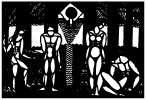| |
The second special performance event during the summer of 1916 that was not part of the four planned bills (the first being the Boyce and Hapgood play Enemies) was a play for children. Mother Carey’s Chickens was written by Columbia English professor Henry Marion Hall and the title refers to the alternate sailor name for storm petrels, birds that appear to be walking on the water (thus petral referring to St. Peter) when they hover above the sea to feed on small fish; sailors tended to see these little birds just before a storm. Most of what is known about the performance, not listed by the important historical accounts by Kenton or Glaspell, is from interviews and letters from the children of the Players. Professor and Mrs. Hall led the children in rehearsing, which went on for weeks, and the parents made up the audience. Black tells us that it was a “Montessorian attempt to provide a creative outlet for the children . . . but it became one of the Player’s more ambitious projects, featuring elaborate costumes, special props, and dances.”(1) According to Sarlos, this was a sea play that included pirates, mermaids, and seagulls, as well as storm petrels.
The Hapgood’s daughter Miriam tells that the play was created to keep the Players’ children busy,(2) and their son Charles remembers dragging a pirate chest across the stage with his brother Boyce. The Halls’ three daughters were in the play, one as a little storm petrel and one as a mermaid, while their oldest, Julia, took the lead role of the hero. Mary Vorse’s children Ellen and Heaton as well as Cook’s son Harl participated, and daughter Nilla played the heroine. A group of little Portuguese boys was recruited to be the pirates. They were dressed “with gold curtain rings in the ears and scarlet bandannas” and sang together a pirate song with the chorus “In Zanzibar, ol’ Zanzibar, ahoy!”(3) It seems the play was so well received that a second performance was scheduled for the next day, but the adulation evidently went to the Halls’ heads, and they created ten new pages, new cues, a change of sex for one of the characters, and a new little dance that their daughter Julia was expected to learn and perform. At the performance the next day, poor Nilla, not having rehearsed the new cues, just started improvising, talking away and saying whatever came into her head until a loud whisper gave a “hissed command ‘do your dance’” and the scene soon ended.(4) These specific incidents left a strong enough impression on Julia and Nilla that they were both able to recall the events to Sarlos almost forty-five years later.
© Jeff Kennedy 2007.
|
